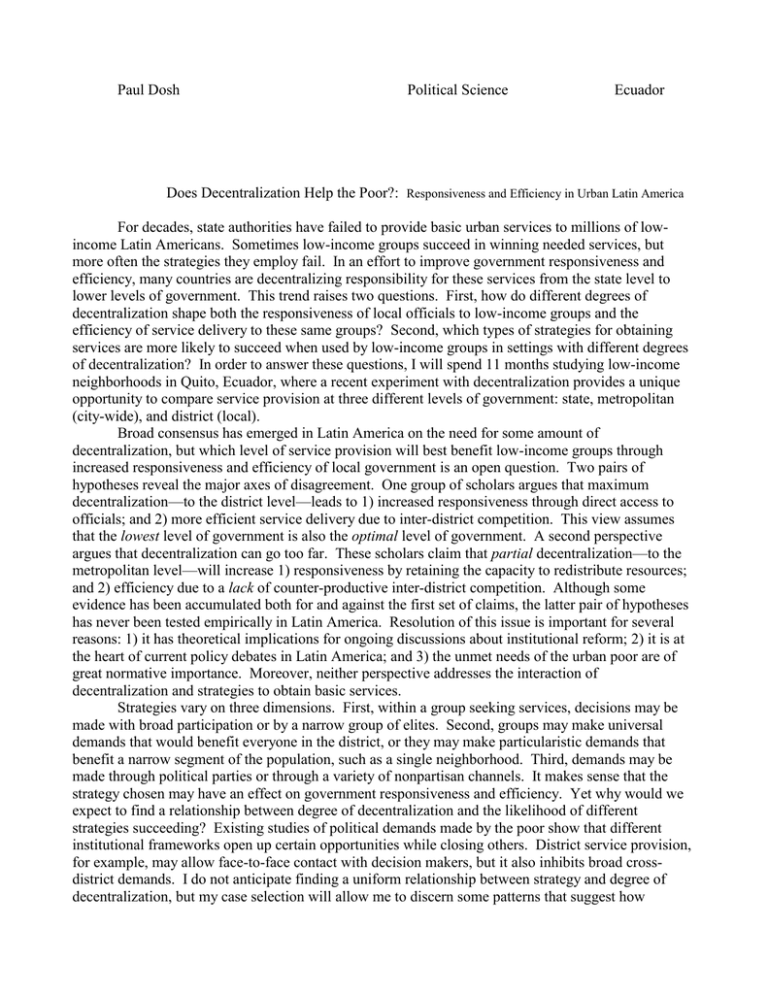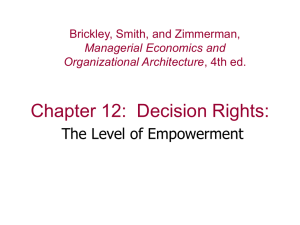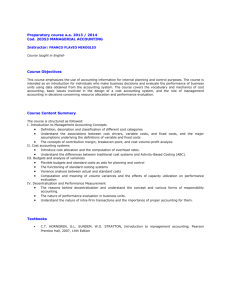Fulbright to Ecuador (Dosh)
advertisement

Paul Dosh Political Science Ecuador Does Decentralization Help the Poor?: Responsiveness and Efficiency in Urban Latin America For decades, state authorities have failed to provide basic urban services to millions of lowincome Latin Americans. Sometimes low-income groups succeed in winning needed services, but more often the strategies they employ fail. In an effort to improve government responsiveness and efficiency, many countries are decentralizing responsibility for these services from the state level to lower levels of government. This trend raises two questions. First, how do different degrees of decentralization shape both the responsiveness of local officials to low-income groups and the efficiency of service delivery to these same groups? Second, which types of strategies for obtaining services are more likely to succeed when used by low-income groups in settings with different degrees of decentralization? In order to answer these questions, I will spend 11 months studying low-income neighborhoods in Quito, Ecuador, where a recent experiment with decentralization provides a unique opportunity to compare service provision at three different levels of government: state, metropolitan (city-wide), and district (local). Broad consensus has emerged in Latin America on the need for some amount of decentralization, but which level of service provision will best benefit low-income groups through increased responsiveness and efficiency of local government is an open question. Two pairs of hypotheses reveal the major axes of disagreement. One group of scholars argues that maximum decentralization—to the district level—leads to 1) increased responsiveness through direct access to officials; and 2) more efficient service delivery due to inter-district competition. This view assumes that the lowest level of government is also the optimal level of government. A second perspective argues that decentralization can go too far. These scholars claim that partial decentralization—to the metropolitan level—will increase 1) responsiveness by retaining the capacity to redistribute resources; and 2) efficiency due to a lack of counter-productive inter-district competition. Although some evidence has been accumulated both for and against the first set of claims, the latter pair of hypotheses has never been tested empirically in Latin America. Resolution of this issue is important for several reasons: 1) it has theoretical implications for ongoing discussions about institutional reform; 2) it is at the heart of current policy debates in Latin America; and 3) the unmet needs of the urban poor are of great normative importance. Moreover, neither perspective addresses the interaction of decentralization and strategies to obtain basic services. Strategies vary on three dimensions. First, within a group seeking services, decisions may be made with broad participation or by a narrow group of elites. Second, groups may make universal demands that would benefit everyone in the district, or they may make particularistic demands that benefit a narrow segment of the population, such as a single neighborhood. Third, demands may be made through political parties or through a variety of nonpartisan channels. It makes sense that the strategy chosen may have an effect on government responsiveness and efficiency. Yet why would we expect to find a relationship between degree of decentralization and the likelihood of different strategies succeeding? Existing studies of political demands made by the poor show that different institutional frameworks open up certain opportunities while closing others. District service provision, for example, may allow face-to-face contact with decision makers, but it also inhibits broad crossdistrict demands. I do not anticipate finding a uniform relationship between strategy and degree of decentralization, but my case selection will allow me to discern some patterns that suggest how different levels of decentralization may advantage or disadvantage certain groups depending on their ability to carry out various strategies. To analyze the effects of decentralization and strategy on responsiveness and efficiency, I have chosen to examine efforts to obtain basic service provision by urban dwellers in Quito's low-income neighborhoods. I have chosen Quito because of the unique research opportunity created by Ecuador's 1991 decision to decentralize responsibility for basic services to a newly created metropolitan council and mayor of Quito. No other major city provides this kind of research opportunity. This metropolitan government now has well-defined responsibilities and broad authority over Quito's 16 urban districts. Within these districts, I will study efforts to win service provision in four pairs of low-income neighborhoods (a total of eight), each pair of neighborhoods in a different district, some of which are still struggling to obtain essential services. I will study service provision and demands for basic services during two time periods. During the first period, 1979-1991, local district leaders were directly elected (and thus at least nominally accountable to their district, rather than the state), but the state government centrally controlled provision of all potable water, electricity, and sewerage. During the second time period, 1991-2001, leaders were directly elected at the district and metropolitan levels, but the metropolitan government was responsible for water, electricity, and sewerage in Quito. During both time periods, however, garbage collection and simple road maintenance were provided at the district level. Study of these time periods permits analysis of decentralization's effects on responsiveness and efficiency through multiple comparisons. I will compare: 1) state and district provision of different services from 1979 to 1991; 2) metropolitan and district provision of different services from 1991 to 2001; 3) state and metropolitan provision of the same services across different time periods (1979-91 and 1991-2001). While other cases would allow examination of state versus district service provision, only Quito permits study of all three levels of service provision. Just as my choice of time periods ensures variation in degree of decentralization, my choice of neighborhoods will maximize variation in strategies pursued by low-income groups. Once in the field, I anticipate spending the initial two months selecting eight low-income neighborhoods that have demanded different services with varying degrees of success. Selecting neighborhoods that contain within-case variation (i.e. success and failure of different service demands) will allow me to control for many neighborhood-level factors including size, age, population density, distance from city center, economic status, and local geography. While these controls will allow for systematic analysis of the impact of degree of decentralization on responsiveness and efficiency, variation in strategies (e.g. universal vs. particularistic strategy) pursued across pairs of neighborhoods will permit investigation of the effects of type of strategy. In order to gather data on my eight neighborhood cases, I will conduct in-depth interviews with both structured and open-ended questions with past and present neighborhood leaders, elected district and metropolitan officials, and administrators within service agencies (e.g. the Metropolitan Potable Water Company). These will support data gathered locally from the National Institute of Statistics, the Center for the Study of Structure and Administration of Government, and news sources available only in local archives (e.g. Quito's three daily newspapers). Both the interviews and archival data are essential to my project and can only be obtained in Quito. Based on these data, I will create indicators for four key variables: Degree of decentralization: 1) percentage of relevant budget controlled by agency (e.g. the portion of Quito's sewerage budget actually controlled by the metropolitan government and not the state); 2) percentage of population served by each agency; and 3) whether or not agency decisions are final or need approval. Type of political strategy: 1) number of participants in decisionmaking; 2) percentage of district population that would benefit from a demand; and 3) amount of party-affiliated resources— financial, organizational, or political—supporting a demand. Government responsiveness: 1) percentage change of households with access to services following demands for services; and 2) the speed with which demands are met. Government efficiency: 1) change per capita cost of service provision (controlled for inflation). I expect to make three main contributions with my dissertation. First, I will use the unique case of Quito to present a more nuanced analysis of decentralization in Latin America, which for many has been only a state vs. district debate. I will connect this to a growing debate in U.S. cities over the merits of service provision at the metropolitan level. Second, I will test several general theoretical propositions from the literature on decentralization and examine their interaction with the effects of political strategies. This is an area of growing interest in the Latin American field, but empirical studies often lack a theoretical framework. Third, I will build on the small, but growing literature on the neglected topic of Latin American cities. In a region where an increasing majority live in major cities, scholars have paid comparatively little attention to large urban centers. I have arranged to work as an affiliated scholar at the Latin American Faculty of Social Sciences (FLACSO) during my time in Quito (Sept. 2001-July 2002). The director of FLACSO, Professor Fernando Carrión, is Ecuador's leading scholar on urban politics and decentralization and has agreed to assist me with my fieldwork. The faculty of FLACSO will serve as an excellent forum for both formal and informal presentations of my ongoing research. Paul Dosh Political Science Ecuador Page 6 continued






